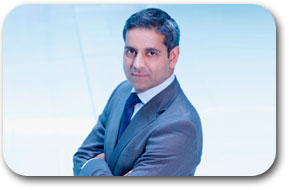
Wealth Management is a multi-step process that provides you with two important things:
- An in-depth review of your current financial situation, and;
- a blueprint that shows you how to achieve your financial goals and objectives for the future.
At Myra & Co., we understand that wealth management is a continuous process . . . not an event. . . towards a secure & bright financial future for our elite clientele. Based upon various stages of an individual's life characterized by some special set of needs, we have devised a questionnaire which attempts to address a host of issues surrounding them. Here is a glimpse of a few such situations...
 "Love my hard earned 'Financial Freedom'. The studies were worth the great job I have landed."
"Love my hard earned 'Financial Freedom'. The studies were worth the great job I have landed."
- Right now enjoying the fruits - remuneration, salary.
- Latest cell phone and fancy gadgets.
- Branded clothes, restaurant visits with friends and fun filled picnics.
- Life's a dream..!!!
Q: My parents nag me to save. How much should I save without compromising my lifestyle?
A: This is the time to inculcate the habit of budgeting your expenditure. By all means enjoy your life but try to be in charge of your monthly expenses and save at least 30% of your income. In fact, save more if possible as the early savings will enjoy the power of compounding to fund your future financial goals..!!!
Q: I can understand only Bank FDs. But I get calls from telemarketers offering an array of investment products. I am confused.
A: Your choice of investment products should match your goals. For short term goals occurring in less than 5 years, opt for fixed income products like FDs, bonds etc.
However, this is the age to start building a solid equity corpus by having a long term view of minimum 15 years and above. For selection of investment products in this dynamic market which are in tune with your specific circumstances and needs, always consult your investment advisor.
Q: My parents have earmarked certain funds for my marriage. However I wish to have a lavish wedding and wish to contribute towards the marriage kitty. Where can I invest my savings so as to earn a decent return?
A: Since you want to save for a goal which is just say two to three years away, you have to have safety of your capital and thereby earn a moderate return. Today the fixed income products market has become very advance and dynamic. There is an array of products available beyond Bank FDs. You may consult an Investment Advisor who will guide you into buying Tax efficient Fixed Income Products
Q: A few years down the line I wish to pursue studies overseas to advance my career. However I do not want to burden my parents with the expenses. What options are available to me?
A: Advanced studies in India or abroad do cost a fortune. Financial Institutions offer attractive Education Loan options where you pay off the loan after you get a job on completion of higher education. If you wish to reduce the loan component, you can start investing systematically as much amount as possible out of your monthly income. The choice of investment products will depend upon the tenure of your investment.
Q: I tend to overspend. How do I manage my credit card debts?
A: Draw a budget of your monthly expenses and stick to it. Credit card debts are the costliest form of loan. Do not roll over your outstanding dues. In fact if there are any outstanding credit card dues, it would make sense to opt for a personal loan and pay them off. Use only one universally accepted credit card and pay off the entire due money at one go in given time limit. If you feel you may not have the self discipline to control your expenses, use debit card instead of credit card.
Q: Do I really need insurance? I do not have any dependents.
A: You do not need insurance if you do not have any dependents. However, if you see yourself getting married, and having a family few years down the line, you may feel the need to buy insurance at that time. Hence we would advise that you obtain some life insurance today, as the premium charged by Life Insurance companies to cover younger age group people is lesser.
 "We are happily married and are blessed with two wonderful kids."
"We are happily married and are blessed with two wonderful kids."
Q: We want to settle down in Mumbai and our concern is to buy a house here. I have savings in Bank FDs and a few Mutual funds. However the same is evidently not sufficient to buy our dream house. How much housing loan should I take? Whether this is a good time to buy?
A: For buying a residential house, any time is a good time. In fact sooner you go for a housing loan; you can aim to pay off the same before your retirement at relatively lower EMIs. The Banks and Financial institutions providing housing loan can work out your loan eligibility on the basis of your income and expenditure pattern. However, we urge you to get the financial planning exercise done which considers all your future goals like children's education, marriage and most importantly provision for your retirement planning and chalks out a road map to achieve these typical goals. Acquiring a house is one of the goals in your income earning phase. To know more about this, contact us.
Q: We wish to provide for my children's higher education. We do not know how much it will cost at this juncture. How do we plan for the same?
Cost of children's education is growing at an accelerated rate. However, generally the need arises around 18-20 years of age. Since your children are young, you can comfortably start investing for this goal. As to the planning of investments to match the education need, a Financial Planner will be able to guide you. While planning for this goal, other important aspects like, requirement of Term Insurance to cover your family will also need to be taken into account. This is of utmost importance as dreams of your loved ones need not crumble on account of any unwanted and unforeseen circumstances.
Q: We had purchased two insurance policies after a year of our marriage. Do we require more insurance?
A: Life Insurance is the backbone of any family's financial planning. Any family's goals and aspirations and most importantly the livelihood of the survivors should not be at the mercy of an individual's earnings. The need for insurance has to be assessed scientifically and life Insurance of that value needs to be purchased.
Q: Is it advisable to invest in gold ETF? My wife has gold jewellery and I have also bought gold coins on auspicious occasions. I wish to accumulate gold for my daughter's marriage.
A: Gold ETF is also called paper gold. This investment does away with the problems of storage of gold, doubts about purity of gold, payment of taxes like VAT on purchase. One unit of Gold ETF is equivalent to the rate of one gram of gold. Gold ETFs track the value of physical gold. Hence you may invest in the same, to accumulate gold for your daughter's marriage.
Q: Our parents may require financial help in case of medical emergencies. We have Company provided mediclaim covering only our family. How to address this need?
A: Since the possibility of changing the jobs cannot be denied, you should have individual mediclaim covering your family in addition to the one provided by your company. You may also explore the possibility of adding your parents in your family medical insurance. If it is not possible due to their advanced age, you should start building a corpus to meet the unforeseen medical emergencies.
Q: Why do we need Financial Planning?
A: Financial planning is a 360 degree exercise analysing your income, expenditure, assets and liabilities. This aims to provide a Road Map to achieve your financial goals and aspirations spanning your lifetime. The indicative list of goals with different time span can be: an immediate purchase of a house, children's education to the longest term goal of retirement planning. You can also add aspirations such as foreign tour for the family.
Financial Planning takes into consideration the priorities of the goals, viability of the amounts and time span of the goals and draws a strategy to achieve these goals.
The entire exercise is done on the basis of data provided by you and after assessing your comfort level for different types of investments.
 "I am comfortably settled in my career. I stay in my own house with my family. Children are pursuing higher education."
"I am comfortably settled in my career. I stay in my own house with my family. Children are pursuing higher education."
Q: One of my children wants to go abroad for higher education. Although I have savings to fund his education, I feel it will eat up my major portion of savings. Do I have any other options?
A: Higher education abroad without any scholarships does cost. You may think of funding the education partly through your own savings and partly by availing of the education loan. The unique feature of the education loan is that it can be repaid by your son/daughter after they get a job on completing the higher education.
Q: I hear a lot about Retirement Planning. How early one should start to do this exercise?
As the name suggests it is "Planning for your retirement". The main concerns during the Retired life are - Health and Impact of Inflation. Retirement planning addresses both the concerns by ensuring funds to cater to any medical exigencies and ensuring that you have a steady source of income to meet your ever growing, inflationary expenses. Incidentally, this is the last chance you will have to buy maximum possible health insurance which is a must for a relaxed retired life. It has to be borne in mind that your retired life may be equal to your working life, as the lifespan in general has risen on account of improved medical facilities. The aim is to generate a corpus, the income from which is sufficient to cater to your above needs during retirement.
We always advise that the planning for retirement should start as early as possible as it gives the investor's earnings, the power of compounding. However as we near the Retirement age, the planning becomes slightly complex. You have other goals like children's education, their marriage and your accumulated savings get used up to fulfil these goals. Then you have lesser savings, fewer years to save and invest but the strategy to accumulate the retirement corpus cannot be aggressive as we have to bear in mind safety of capital as well.
While doing the Retirement planning an Advisor would take into consideration your income expenses patterns, available savings and years to retirement at the time of this exercise.
Q: My company provides Medical Insurance to myself and my family. Do I need to buy additional health insurance?
A: You will need health insurance for as long as you live. Though your company provides you with one, the cover will cease to exist once you retire. At that time it will be extremely difficult to buy health insurance for you and your spouse. Moreover the premiums will tend to be exorbitant.
Hence, you should buy health insurance as early as possible so that the cover will be available to you when you will need it the most, i.e. when you are retired.
 "I have a unique set of circumstances in life and I need an advisor who addresses my specialized needs."
"I have a unique set of circumstances in life and I need an advisor who addresses my specialized needs."
Q: I am a single parent and wish to ensure the best possible advanced education for my child and also plan a comfortable retirement for myself.
A: You have the responsibility of bringing up your child single-handedly. Be prudent with your finances and get a financial plan prepared through an experienced financial planner. The important thing to bear in mind is to have an adequate Term insurance cover with Waiver of Premium clause incorporated which will take care of your child's future requirements (education being one of them). You may also think of creating a Trust for your child which will ensure prudent distribution of the corpus commensurate with the child's needs, in case of the unforeseen eventuality.
As far as retirement planning is concerned, the financial planner will guide you through the nitty-gritty of the same. However the time for action to be taken to accumulate the retirement corpus is 'Yesterday'
Q: How do I ensure my child's (with special needs) well being after my demise?
A: A child with special needs requires to be looked after throughout his lifetime. For this you need to have as big a corpus as possible. As a matter of abundant precaution you can go for a high term cover. An option of Whole life policy with limited payment period can be explored where the beneficiary is the child. However, the key is to appoint a guardian whom you trust to look after your child's financial requirements. Else, create a trust in favour of your child where the guardian can be trustee. As far as creation of corpus for your child is concerned seek help of an experienced financial planner who will advise you on the tax efficient ways and means of doing the same.
Q: I am self employed /professional and earn income at varying time intervals. How do I bring about stability in my finances?
A: Draw a budget of monthly expenses and accumulate funds equivalent to 9 to 12 months regular expenses in a saving account. This is your back up against erratic income. Opt for maximum health insurance coverage for your family. Save aggressively whenever there is excess money. Majority of your investments should be in safer, interest bearing securities. However, to assess the optimum percentage of equity instruments in your portfolio, Contact Us
 "I will retire in 1-2 years/ have retired last year. I have saved a sizeable nest egg during my career."
"I will retire in 1-2 years/ have retired last year. I have saved a sizeable nest egg during my career."
Q: If I do not have any financial responsibility do I need retirement planning now?
A: Congratulations on fulfilling your responsibility towards your children successfully! Now the aim is to utilise the nest egg judiciously to last you and your spouse's lifetime. The main concerns of retirement are Inflation, rising medical cost and against this background -outliving your income! This necessitates the retirement planning exercise. Incidentally, retirement planning also considers fulfilment of your long pending desires like, tours and travels, charity etc. Within the available resources a priority based retired life planning is possible.
You need a Financial Planner to help you address your concerns and will enable you to lead a secured retired life.
Q: I think equity investment is risky. I want to stick to only fixed income investment like Bank FD, Sr. citizen scheme and Post office instruments. Will this approach work?
A: Although fixed income instruments give you guaranteed returns, taking into account the ever growing inflation, your purchasing power reduces over a period of time. On the other hand since the corpus remains the same and the income from fixed income instruments too remains the same, you may run the risk of dipping into the corpus to fulfil the increased expenses.
Hence we would advise you to invest a small part of your nest egg into equity which needs to be invested with a long term investment horizon. The equity portion over a long period of time would fetch better returns compounded over time and as a result your corpus will grow. A part of the corpus after passage of time will be shifted to fixed income investments; but Equity should remain a part of your investment portfolio. For the right asset mix, Contact Us
 "I am settled abroad and may or may not want to return to India. I wish to participate in the India Growth Story."
"I am settled abroad and may or may not want to return to India. I wish to participate in the India Growth Story."
Q: On retirement if I wish to return to India, how do I build a corpus which will sustain me in my golden years?
A: Indian economy provides you with attractive opportunities in both Equity and fixed income (Debt) segments. Depending on the time span available to build the retirement corpus, we will be able to suggest different strategies to accumulate the corpus. The retirement planning exercise is done in a conservative manner and we aim at capital preservation during the retired phase of life. However the investments mix is aimed at giving reasonable inflation adjusted returns during your retired life.
Q: Real Estate investor
A: If you wish to invest in Indian Real Estate Market, be it a plot of land or residential property in Mumbai and its periphery, we will be able to help you with research and the paper work, once the property is selected and Loan assistance if needed.
Q: India Fund v/s direct investment in India
A: NRIs are aware of India Funds floated by different Mutual Fund houses. You may have investments in these India specific schemes as well. Instead of investing in the India Growth story in an indirect way, we will assist you to invest in Indian Equity either by direct investment into blue chip shares or through Indian Mutual Fund houses. The process of investment in Indian Equity Mutual Funds schemes is relatively simpler and does not need RBI permission for the same.